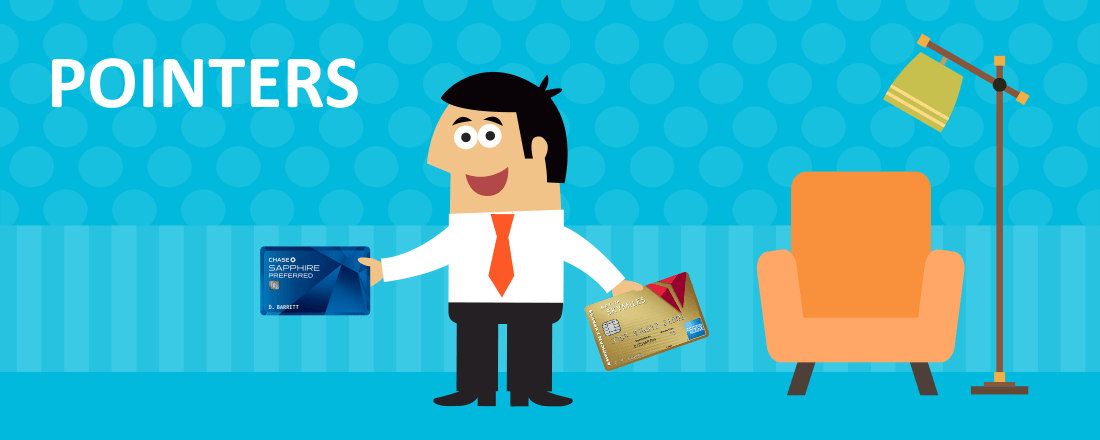
Not long ago I was planning a trip to visit family on the other side of the country and I wanted to pay for my flight with miles. Since my miles and points balances were low, I decided to get a new
I’d been interested in the Chase Sapphire Preferred card for a while because of its generous intro bonus and numerous airline transfer partners. Plus its part of the flexible Ultimate Rewards program.
I had already done some research though, and I knew my options for flying the route I needed on the dates I wanted were very limited. In fact, Delta was the only carrier that offered reasonable fares and didn’t require an overnight layover en route.
Since I knew I was going to fly on Delta, I wondered if it would be better to go with the airline’s own co-branded card. So I added the Gold Delta SkyMiles American Express card to my list for consideration.
Here’s a quick overview of the differences between the Chase Sapphire Preferred and Gold Delta SkyMiles cards:
| Chase Sapphire Preferred | Gold Delta SkyMiles Amex | |
|---|---|---|
| Sign-Up Bonus | 50,000 Ultimate Rewards points | 30,000 Delta SkyMiles |
| Earning Potential | 2x on all travel and at restaurants; 1x all other purchases 50% more in travel redemption. Get 50% more value when you redeem for travel through Chase Ultimate Rewards.* For example, 50,000 points are worth $750 toward travel. | 2x on Delta; 1x all other purchases Earn 30,000 Bonus Miles after you make $1,000 in purchases on your new Card within your first 3 months and a $50 statement credit after you make a Delta purchase with your new Card within your first 3 months. |
| Annual Fee | $95, waived for the first year $450 | $95, waived for the first year $0 intro fee, then $95 |
| Other Perks | 20% off travel purchased through Ultimate Rewards | Free checked bag; in-flight discounts; priority boarding; discounted Sky Club access; flexible miles+cash awards |
Let’s take a closer look at what these two cards have to offer.
Welcome Bonus
Right off the bat, Chase Sapphire gets a big plus for offering a generous intro bonus of 50,000 Ultimate Rewards points. You’ll also get another good portion of points if you add an authorized user. The Gold SkyMiles card comes with a smaller 30,000-mile bonus. Get a $50 statement credit if you make a Delta purchase within 3 months.
The Gold SkyMiles card comes with a 30,000 bonus milesThere’s a little more to the story though. You only have to spend $1,000 to get the Delta bonus, but Chase Sapphire has a notably higher $4,000 minimum spend. With both cards, you have three months to reach the spending threshold.
For some, that’s not a big of deal. I could do it if I put a few big purchases on the card and used it to pay my other recurring bills.
Unfortunately, I needed the points as quickly as possible since I didn’t have much time before I had to book my flight. Charging $1,000 in one month was definitely doable, but hitting $4,000 before the first statement would be difficult.
Flexibility
Chase Sapphire is hard to beat for flexibility. You can transfer your points to miles at a 1 to 1 ratio with British Airways, Korean Air, Singapore Airlines, Southwest Airlines, United and Virgin Atlantic. That gives you access to all three of the major airline alliances since United and Singapore Airlines are Star Alliance members, British Airways is a oneworld member and Korean Air belongs to SkyTeam. Not to mention that Southwest is the world’s largest low-cost carrier.
You can fly virtually anywhere with Chase Ultimate Rewards points. And if you’re interested in using those points for hotels stays, you can transfer them to Hyatt, IHG, Marriott and Ritz-Carlton.

Sapphire cardholders can also make travel purchases through the Chase Ultimate Awards website and get a 20 percent discount. That includes all travel: airfare, hotels, car rentals, cruises and sightseeing.
As you might imagine, you earn Delta miles with the Delta card. You can use those miles to book flights on the 20 SkyTeam alliance members, but you can also do that with Chase Ultimate Rewards points.
The Delta Amex card does offer one point of flexibility you don’t get with Chase Sapphire. As a cardholder you can reduce the cash cost of Delta flights by paying for part of the fare with miles. You won’t get as much value for your miles, so it’s still best to wait until you have enough in your account to pay for the entire fare. But if you’re in a pinch, it might come in handy.
Cash + Miles fares are only available on select tickets in certain markets if you don’t have a Delta SkyMiles Amex card.
Earning Potential
There’s no doubt that you’ll earn faster with Chase Sapphire. You’ll get double miles on all travel purchases, not just airfare. That includes car rentals, taxis, trains, hotels and more. Plus you’ll also
With the Delta Amex, you’ll get double miles on Delta purchases only. Everything else earns one mile per dollar.
What Else Do You Get?
The SkyMiles Amex card comes with some nice perks if you’re flying on Delta. You’ll get a free checked bag, priority boarding, a special discount on in-flight purchases and good discount for every pass to Delta’s Sky Club lounges.

These are great benefits if you’re getting the card for other reasons as well, but they don’t really justify applying for the card. For example, it’s hard to imagine that the money you’ll save on free checked bags and lounge passes will ever equal the 20 percent savings Sapphire offers on travel purchased through the Ultimate Rewards portal.
Cardholder Perks
The Delta Amex and Chase Sapphire cards both come with the cardholder perks you’d expect from a midlevel rewards card. Neither charges foreign transaction fees, plus they both offer roadside assistance, return protection, car rental loss and damage insurance, purchase protection and travel accident insurance. Amex offers a Global Assist hotline, whereas Chase gives you 24/7 access to a Sapphire customer service specialist wherever you are in the world.
Annual Fee
Both cards have a $0 intro fee, then $95 annual fee that’s waived for the first year.
Which Card Do You Get?
In nearly every way the Chase Sapphire Preferred card beats the Gold Delta SkyMiles Amex card. With Chase, you can transfer points to at least one carrier in each of the three major airline alliances. Delta gives you access to only one alliance.
If need more options for spending your Chase points, you can also purchase travel at a 20 percent discount directly through the Ultimate Rewards travel portal. Add to that flexibility the bigger intro bonus and
It may surprise you, then, that I ended up getting the Delta card. The reasons were simple. I knew I couldn’t meet Chase’s $4,000 minimum spend in time to purchase the tickets I needed. I also knew that Delta offered the flights I wanted at the right price, so flexibility wasn’t important to me.
Now that my flights have been purchased, though, I’m ready to pull the trigger on a Chase Sapphire card so I can be ready for my next adventure.

